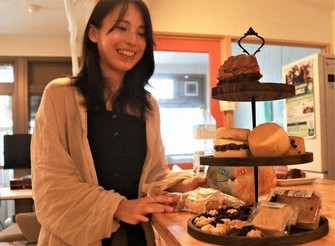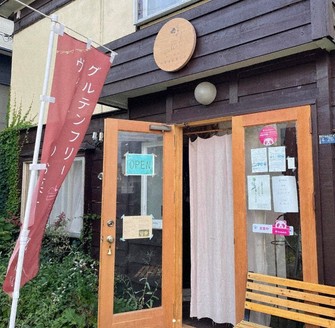
Arisa Shibata, head of Treasure in Stomach, is seen in Tokyo’s Shibuya Ward, with pieces of chocolate cakes her company offers, on Sept. 10, 2025. (Mainichi/Moe Yamamoto)
TOKYO — Pieces of cake finished with plenty of chocolate cream and tender scones fresh from the oven are some of the seemingly ordinary sweets friendly to vegans and people with gluten allergies now offered at stores in Sapporo.
“I want to create a future where everyone can enjoy delicious meals together around the same table, even with dietary restrictions,” says Arisa Shibata, a 35-year-old entrepreneur who is aspiring to expand her business abroad.
A native of Sapporo, Shibata has been plagued by wheat allergy and atopic dermatitis since her childhood.
“Since my grandfather is German, bread, pasta and other dishes made with flour were a common sight on our family table, but I couldn’t eat them because I would develop allergic symptoms. Even when I grew older and visited cafes with my friends, I remember having no choice but to sip tea while everyone else was savoring parfaits. I felt sad for being cast out of the circle of friends enjoying yummy food, and I also felt bad for making them concerned about me,” Shibata recounted.
After graduating from the Tokyo University of Science, Shibata started working at a major IT ad agency. However, her father was diagnosed with pancreatic cancer in 2014 and given six months to live. Wishing to be by his side, she quit her job and moved back to Hokkaido.
During her college days in Tokyo, Shibata used to work part-time at a confectionery shop, dreaming of someday running a cake shop of her own. Her allergies had temporarily subsided at the time, and she was working while taking oral and topical medications. Just as she was gaining experience in accounting and cooking at a design company and a restaurant after returning to Hokkaido, her father passed away after a yearlong battle with cancer.
“Life is short. I should do whatever I want to do,” she thought.
Having realized that confectionary making as work was fun and suited her, she founded the company “Treasure in Stomach” in 2017. She also launched a food brand called “CHaT” and engaged in the development and sales of sweets completely free of dairy products, eggs, wheat and refined white sugar.
Making sweets that can please everyone

Arisa Shibata, head of Treasure in Stomach, is seen in Tokyo’s Shibuya Ward on Sept. 10, 2025. The company sells cakes, scones, cookies and other sweets that are free of eggs, dairy and wheat flour. “It delights me when I receive a letter from our customer saying our products are delicious,” she says. (Mainichi/Moe Yamamoto)
“I started my company on my own and was initially running it without any colleagues. I studied vegan by myself, but I ended up hiring a patissier as I felt there were limits to the quality of sweets I could make, having no experience studying at a confectionery school,” Shibata reflected.
Among those who have become patissiers for their love of sweets, there are some who developed wheat and other food allergies due to their longtime exposure to wheat flour. Shibata has hired those who still wanted to pursue their dreams even despite those conditions, gradually increasing her allies.
“By hiring a pastry chef, we’ve been able to bring our ideas to life like creating cute decorations and making delicious mousses, expanding both the range of products we could offer and the variety of designs and flavors we could propose. Hokkaido is home to many brand products and shops, like those that offer chocolates and butter sandwich cookies, and the area is full of affordable, delicious sweets. Since gluten-free foods tend to be expensive, we aimed to create a shop with a price range suitable for everyday use,” Shibata explained.
The flagship products of CHaT are scones made of rice flour and cookies completely free of allergens. The food brand has devised various ideas such as blending coconut oil and almond butter to resemble butter and using cane sugar instead of white sugar to maintain sweetness.
“I hope not only vegans and those concerned about gluten-free diets, but also regular people will enjoy our products,” Shibata said.
CHaT places particular emphasis on taste and texture, constantly refining their approach from ingredient selection through trial and error — even soliciting feedback from repeat customers at times — to ensure their rice flour sweets never evoke common complaints like “dry and crumbly,” “hard,” or “plain in both taste and appearance.”
“For people with wheat allergies like me, the only thing they could eat at a cake shop is pudding. While shops using plant-based ingredients are gradually increasing, they are mostly found in urban areas. If you travel a little further into the countryside, I still find that the options are quite limited,” Shibata noted.
Her company’s chocolate cakes, topped with plenty of whipped cream made from chocolate and soy milk, are hardly distinguishable from regular cakes unless you are told they are gluten-free.
They also sell tarts featuring seasonal fruits and Mont Blanc sweets. By creating desserts that taste good even after being frozen and thawed, they have expanded their marketing channels through online sales.
Making forays into Tokyo and overseas markets

The Maruyama main store of CHaT is seen in Sapporo in this photo from the brand’s Instagram account. There is another CHaT store in the Hokkaido capital. (Mainichi/Moe Yamamoto)
Treasure in Stomach currently runs two stores in Sapporo and is set to open a third outlet in a department store in Fukuoka in November.
The company is scheduled to run a pop-up store in suburban Tokyo’s Tachikawa at the end of December, and to supply CHaT’s sweets to a cafe in Dubai next year. Shibata feels there is solid demand out there for the products her company offers.
“It is said that around 3 billion people, or about one-third of the world’s population, have some kind of dietary restrictions due to allergies, religious beliefs or health reasons. True to our company name, which implies eating what is good for your stomach and becoming happy, we aim to provide high-quality sweets,” she said.
With the goal of “enabling people with dietary restrictions to live normal lives,” the company is making its mark from Japan’s northern island.
(Japanese original by Moe Yamamoto, Digital News Group)


AloJapan.com